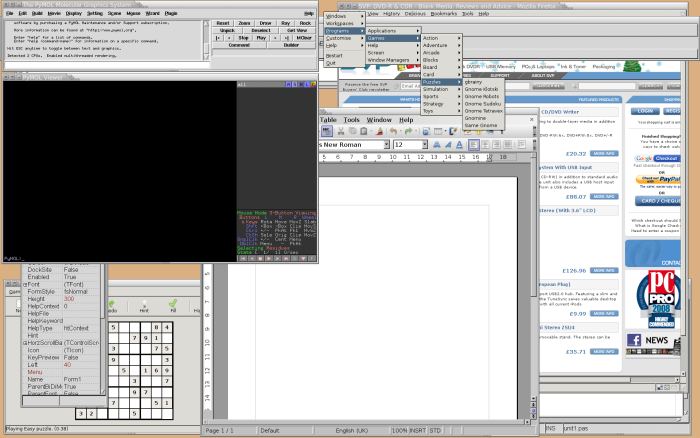Sawfish (formerly known as Sawmill) is an extensible window manager using an Emacs Lisp-like scripting language called Librep. All window decorations are configurable, the basic idea is to have as much user-interface policy as possible controlled through the Lisp language.
Despite this extensibility its policy is currently very minimal compared to most window managers. Its aim is simply to manage windows in the most flexible and attractive manner possible. Consequently, it does not implement desktop backgrounds, applications docks, or other functionality that may be achieved through separate applications.
All high-level window manager functions are implemented in Lisp for future extensibility or redefinition. Currently this includes menus (using GTK+), interactive window moving and resizing, virtual workspaces, iconification, focus/transient window policies, frame theme definitions and much more.
Most received events are exported to the Lisp environment through ‘key-bindings’ and hooks, similar to in Emacs. These events include pointer behaviour and many internal X11 events (enter/leave, focus-in/focus-out, map/unmap, etc..)
Sawfish was used with the GNOME desktop environment until it was replaced by Metacity in GNOME 2.2 because of issues including accessibility, maintainability of the code, and multi-head support.
Features include:
- Highly configurable.
- Powerful key-binding: Functionality can be bound to keys or mouse buttons.
- Event hooking: Customize how Sawfish responds to events such as moving windows.
- Window matching: Match windows to a set of rules and automatically perform actions on them.
- Flexible theming: Permits themes to be created and a variety of third-party themes are readily available.
- All high-level wm functions are implemented in Lisp for future extensibility or redefinition.
Website: sawfish.wikia.com
Support: Documentation
Developer: John Harper, Sawfish community
License: GNU General Public License v2.0

Sawfish is written in C. Learn C with our recommended free books and free tutorials.
Return to Window Managers | Return to Stacking Window Managers
| Popular series | |
|---|---|
| The largest compilation of the best free and open source software in the universe. Each article is supplied with a legendary ratings chart helping you to make informed decisions. | |
| Hundreds of in-depth reviews offering our unbiased and expert opinion on software. We offer helpful and impartial information. | |
| The Big List of Active Linux Distros is a large compilation of actively developed Linux distributions. | |
| Replace proprietary software with open source alternatives: Google, Microsoft, Apple, Adobe, IBM, Autodesk, Oracle, Atlassian, Corel, Cisco, Intuit, SAS, Progress, Salesforce, and Citrix | |
| Awesome Free Linux Games Tools showcases a series of tools that making gaming on Linux a more pleasurable experience. This is a new series. | |
| Machine Learning explores practical applications of machine learning and deep learning from a Linux perspective. We've written reviews of more than 40 self-hosted apps. All are free and open source. | |
| New to Linux? Read our Linux for Starters series. We start right at the basics and teach you everything you need to know to get started with Linux. | |
| Alternatives to popular CLI tools showcases essential tools that are modern replacements for core Linux utilities. | |
| Essential Linux system tools focuses on small, indispensable utilities, useful for system administrators as well as regular users. | |
| Linux utilities to maximise your productivity. Small, indispensable tools, useful for anyone running a Linux machine. | |
| Surveys popular streaming services from a Linux perspective: Amazon Music Unlimited, Myuzi, Spotify, Deezer, Tidal. | |
| Saving Money with Linux looks at how you can reduce your energy bills running Linux. | |
| Home computers became commonplace in the 1980s. Emulate home computers including the Commodore 64, Amiga, Atari ST, ZX81, Amstrad CPC, and ZX Spectrum. | |
| Now and Then examines how promising open source software fared over the years. It can be a bumpy ride. | |
| Linux at Home looks at a range of home activities where Linux can play its part, making the most of our time at home, keeping active and engaged. | |
| Linux Candy reveals the lighter side of Linux. Have some fun and escape from the daily drudgery. | |
| Getting Started with Docker helps you master Docker, a set of platform as a service products that delivers software in packages called containers. | |
| Best Free Android Apps. We showcase free Android apps that are definitely worth downloading. There's a strict eligibility criteria for inclusion in this series. | |
| These best free books accelerate your learning of every programming language. Learn a new language today! | |
| These free tutorials offer the perfect tonic to our free programming books series. | |
| Linux Around The World showcases usergroups that are relevant to Linux enthusiasts. Great ways to meet up with fellow enthusiasts. | |
| Stars and Stripes is an occasional series looking at the impact of Linux in the USA. | |
